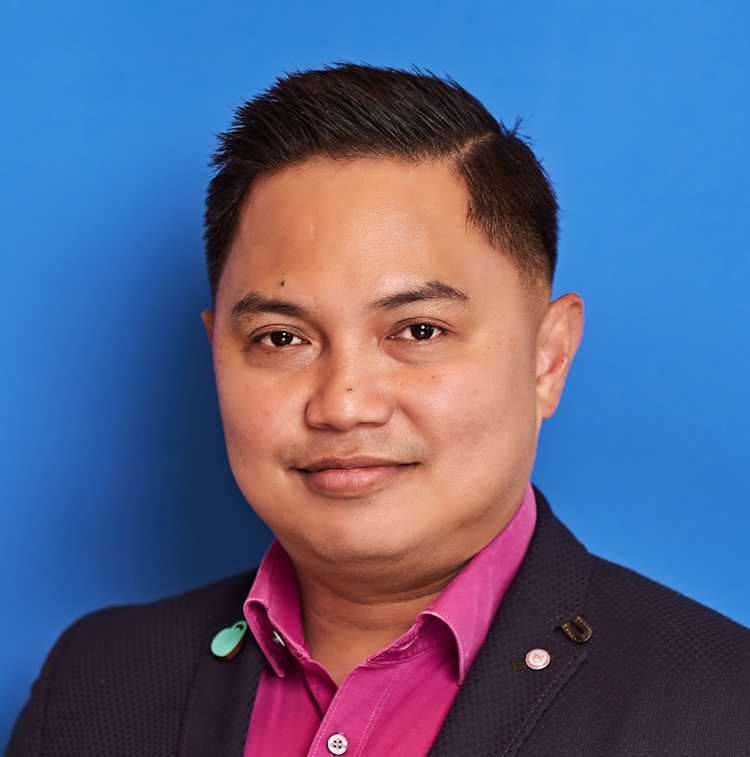- Startseite
- Das GIGA
- Team GIGA
- Dr. Ariel Hernandez
PD Dr. Dr. Ariel Macaspac Hernandez
Research Fellow

Kurzer Lebenslauf
- Seit 07/2024: Research Fellow am GIGA
- 10/2023 – 06/2024: THE NEW INSTITUTE, Hamburg, Fellow, Programm: Non-material conceptions of human flourishing, project: “Homo Curans and scenarios of sustainable futures” und Schreiben des Romans „Homecoming“
- 07/2017 - 06/2024: German Institute of Development and Sustainability (IDOS) (früher Deutsches Institut für Entwicklungspolitik), Bonn, Senior Researcher, Programm für inter- und transnationale Zusammenarbeit, Programm für Umweltgovernance und Transformation zur Nachhaltigkeit,
- Seit 2016: Universität Duisburg-Essen (Dozent/Privatdozent), Fakultät für Sozialwissenschaften,
- 4/-5/2022: Fundação Getúlio Vargas- Escola Brasileira de Administração Pública e de Empresas (FGV EBAPE), Rio de Janeiro, Brasilien, Senior Researcher in Abordnung
- 10/2018 – 09/2019: Institut für transformative Nachhaltigkeitsforschung (IASS) (jetzt Helmholtz-Zentrum Potsdam Deutsches GeoForschungsZentrum), Potsdam, Wissenschaftlicher Mitarbeiter, Koordination der Deutschen Wissenschaftsplattform zur Agenda 2030
- 09/2016 – 10/2017: Käte Hamburger Kolleg/Centre for Global Cooperation Research, Duisburg, Post-Doc-Forschungsstipendiat,
- 11/2014 – 11/2017: Fraunhofer-Zentrum für Internationales Management und Wissensökonomie, Leipzig
- 07/2011 – 10/2014: Institut für Infrastruktur- und Ressourcenmanagement, Universität Leipzig, Post-Doc-Forscher, Chapter Scientist: IPCC, Beitrag zur Veröffentlichung des Energiekapitels des Fünften Sachstandsberichts der Arbeitsgruppe 3 des IPCC
- 01/2008 – 12/2010: Internationales Institut für angewandte Systemanalyse (IIASA), Laxenburg/Wien, Österreich, Forscher und Programmkoordinator, Programmkoordination und Forschung zu internationalen Verhandlungen sowie Stakeholder-Engagement
Studium:
- 2021: Habilitation, Venia Legendi, Institut für Politikwissenschaft, Universität Duisburg-Essen, Deutschland, Prof. Dirk Messner, Habilitationsthese: Setting sustainable low carbon development in motion – negotiation perspectives on transformation pathways
- 2014: Promotion in Wirtschafts- und Sozialwissenschaften (Dr. rer. pol.), Universität zu Köln, Deutschland, Prof. Thomas Jäger, Dissertation: Strategic facilitation of complex decision-making - How process and context matter in climate change negotiations
- 2011: Promotion in Politikwissenschaft (Dr. phil.), Universität Wien, Österreich, Prof. Eva Kreisky, Dissertation: Violence and misrecognition in identity conflicts – mediating agreements in Southern Philippines
- 2010: Master (in Mediation) (M.A.), Juristische Fakultät, Europa-Universität Viadrina, Frankfurt (Oder), Masterarbeit: Mediation not leading to peace – when finished business remains unfinished
- 2007: Master (Magister) in Politikwissenschaft, Soziologie und Pädagogik (Mag. phil.), Geschwister-Scholl-Institut für Politikwissenschaft, Ludwig-Maximilians-Universität München, Deutschland, Masterarbeit: Balikatan military exercises and the US war on terrorism in the Philippines
- 1999: Bachelor of Arts in Philosophie, University of Santo Tomas, Manila, Philippinen (zwei Jahre)
Aktuelle Forschung
- Verhandlungen und Stakeholder-Dialog, Konfliktmanagement
- Transformation zur Nachhaltigkeit, Governance von Nachhaltigkeitstransitionen
- Pflege und menschliches Gedeihen
- Wissenskooperation, Wissenschafts-/Wissensdiplomatie
- Szenarioentwicklung und Zukunftsszenarien
- Nachhaltige Energie, Urbane Mobilität, Ernährungssicherheit
- Klimawandel, Klimagovernance, Umwelt- und Klimagerechtigkeit
Länder und Regionen
- Asien und Pazifik: Philippinen, Indonesien, Indien, Japan
- Lateinamerika und Karibik: Mexiko, Brasilien, Jamaica
- Südliches Afrika: Südafrika
Forschungsschwerpunkte
Mitgliedschaften
- Earth System Governance Project, The Earth System Governance Project is a global, interdisciplinary research network advancing knowledge at the interface between global environmental change and governance. The project aims to explore political solutions and novel, more effective governance systems to cope with global environmental change. The network connects and mobilizes scholars from the social sciences and humanities working from local to global scales., seit 2025
- European International Studies Association (EISA), This section "Rethinking Authenticity: Relational, Embodied, and Marginal Epistemologies in Global IR" advances Global IR by rethinking authenticity as a relational, embodied, and ethical practice of knowledge production. Bringing together decolonial, feminist, queer, disability, care-ethical, regional, and digital perspectives, it interrogates epistemic authority, responsibility, and truthfulness amid global inequality and AI-driven transformations. Authenticity is reframed as responsiveness to lived struggles, relational accountability, and practices of care across local and global scales., seit 2025
- Inochi Forum, Inochi Forum is a platform where individuals come together with the awareness that each and every life on Earth is interconnected. It’s a space for raising voices, listening, discussing, and forming a unified voice that contributes to a global movement. It involves contemplating what Inochi means and what actions need to be taken to ensure ‘No one will be left behind,’ transcending all boundaries of nationality, culture, and background.<br/><br/>Through collaborative efforts involving various stakeholders from industry, government, academia, and civil society on a global scale, we will issue Inochi Declaration at Expo 2025 Osaka, Kansai, Japan. Beyond 2025, we will continue the Inochi Forum as a legacy of the Expo, advancing the Sustainable Development Goals (SDGs) and envisioning the next goals beyond the SDGs., seit 2024